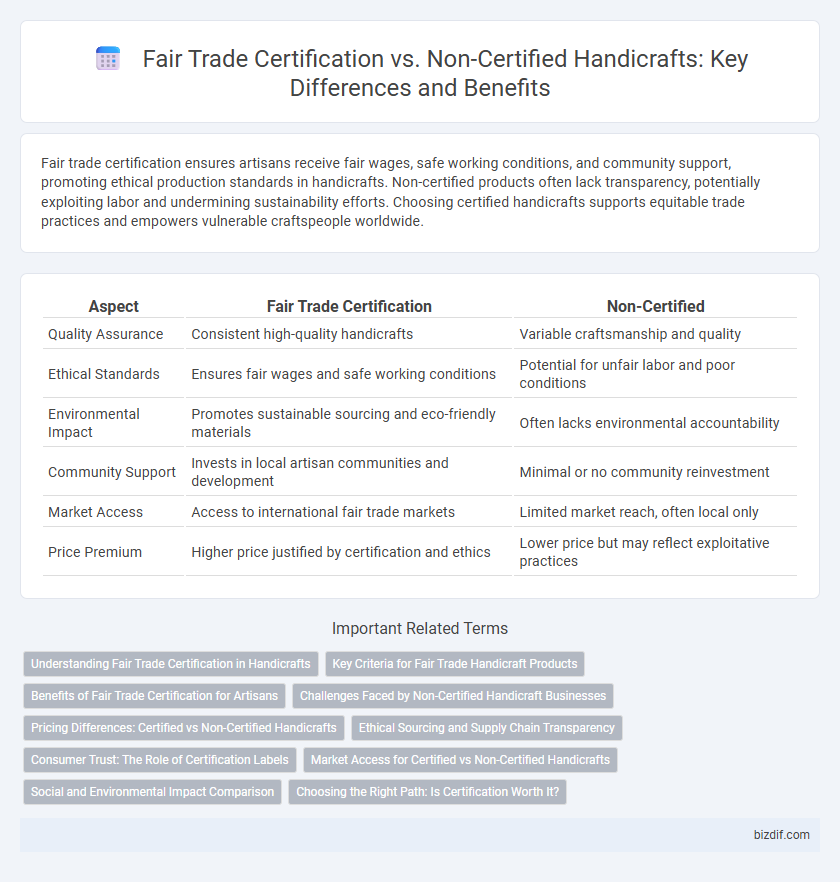Fair trade certification ensures artisans receive fair wages, safe working conditions, and community support, promoting ethical production standards in handicrafts. Non-certified products often lack transparency, potentially exploiting labor and undermining sustainability efforts. Choosing certified handicrafts supports equitable trade practices and empowers vulnerable craftspeople worldwide.
Table of Comparison
| Aspect | Fair Trade Certification | Non-Certified |
|---|---|---|
| Quality Assurance | Consistent high-quality handicrafts | Variable craftsmanship and quality |
| Ethical Standards | Ensures fair wages and safe working conditions | Potential for unfair labor and poor conditions |
| Environmental Impact | Promotes sustainable sourcing and eco-friendly materials | Often lacks environmental accountability |
| Community Support | Invests in local artisan communities and development | Minimal or no community reinvestment |
| Market Access | Access to international fair trade markets | Limited market reach, often local only |
| Price Premium | Higher price justified by certification and ethics | Lower price but may reflect exploitative practices |
Understanding Fair Trade Certification in Handicrafts
Fair Trade Certification in handicrafts ensures ethical sourcing, fair wages, and sustainable production methods, benefiting artisans and their communities by promoting social equity and environmental responsibility. Non-certified handicrafts may lack transparency in labor practices and fair compensation, potentially leading to exploitation and environmental harm. Understanding the impact of Fair Trade Certification helps consumers support artisans who prioritize ethical standards and sustainable livelihoods.
Key Criteria for Fair Trade Handicraft Products
Fair Trade certification for handicraft products ensures adherence to key criteria, including fair wages, safe working conditions, and environmentally sustainable practices. Non-certified handicrafts often lack transparent standards, which can result in inconsistent labor rights and limited environmental accountability. Certification fosters ethical sourcing, empowering artisans while promoting cultural preservation and community development.
Benefits of Fair Trade Certification for Artisans
Fair Trade certification ensures artisans receive fair wages, improving their economic stability and quality of life. It promotes ethical production practices, empowering communities through safe working conditions and skill development. Certified artisans often gain access to international markets, increasing demand and sustaining traditional handicraft techniques.
Challenges Faced by Non-Certified Handicraft Businesses
Non-certified handicraft businesses face significant challenges such as limited market access and difficulty gaining consumer trust compared to their fair trade-certified counterparts. These businesses often struggle with lower profit margins due to lack of premium pricing and reduced visibility in ethical marketplaces. Without certification, artisans may also experience inadequate support for sustainable practices and fair wages, hindering long-term growth and social impact.
Pricing Differences: Certified vs Non-Certified Handicrafts
Fair trade certified handicrafts typically command higher prices due to their ethical production standards, including fair wages and sustainable materials, which appeal to conscientious consumers willing to pay a premium. Non-certified handicrafts often have lower price points as they lack the added costs of certification and ethical assurances, making them more affordable but less transparent in their production practices. Pricing differences reflect the value placed on social and environmental responsibility in certified products compared to conventional, non-certified alternatives.
Ethical Sourcing and Supply Chain Transparency
Fair trade certification ensures ethical sourcing by mandating fair wages, safe working conditions, and environmental sustainability throughout the supply chain. Non-certified handicraft products often lack transparency, increasing the risk of exploitative labor practices and environmental harm. Transparent supply chains in certified crafts promote accountability and empower artisans with equitable economic opportunities.
Consumer Trust: The Role of Certification Labels
Fair trade certification labels significantly enhance consumer trust by assuring ethical sourcing, fair wages, and environmentally sustainable practices in handicraft production. Non-certified products often lack transparent verification, leading to skepticism about labor conditions and material authenticity. Clear certification logos provide consumers with confidence, influencing purchasing decisions toward socially responsible handicrafts.
Market Access for Certified vs Non-Certified Handicrafts
Fair trade certification significantly enhances market access for handicrafts by providing verified ethical standards that appeal to socially conscious consumers and international retailers. Certified handicrafts often secure entry into premium retail channels and global marketplaces, whereas non-certified products generally face limited exposure and rely on local or informal sales networks. This disparity in market access directly influences pricing power, brand reputation, and long-term sustainability for artisans.
Social and Environmental Impact Comparison
Fair trade certification ensures artisans receive fair wages and work in safe conditions, directly improving social welfare in handicraft communities, while non-certified products often lack transparency and may involve exploitative practices. Environmentally, fair trade guidelines promote sustainable material sourcing and reduced ecological footprints, whereas non-certified items might use harmful chemicals and unsustainable resources. The certification's rigorous standards foster long-term community development and environmental stewardship, contrasting with the potential social and environmental risks of non-certified handicrafts.
Choosing the Right Path: Is Certification Worth It?
Fair trade certification guarantees artisans receive fair wages and work in safe conditions, promoting sustainability and community development within the handicraft industry. Non-certified products may offer lower costs but often lack transparency and ethical assurances, potentially undermining long-term social and economic benefits for craftsmen. Choosing certification supports ethical consumerism and helps preserve traditional skills while enhancing market access and product credibility.
Fair trade certification vs Non-certified Infographic

 bizdif.com
bizdif.com